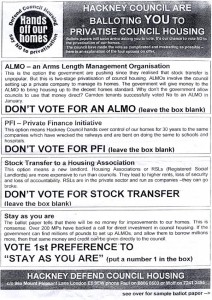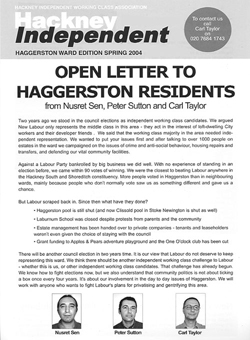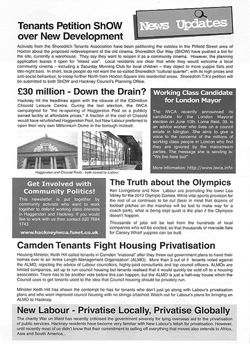Hackney Independent's Peter Sutton interviewed by "Inside Housing" Magazine
Posted: December 7, 2004 Filed under: Gentrification / Regeneration, Media Comments Off on Hackney Independent's Peter Sutton interviewed by "Inside Housing" Magazine
Inside Housing is the weekly magazine for housing workers. Its latest issues includes a 3 page feature on Hackney Council’s “test of opinion” on the Decent Homes Standard, focusing mainly on the Council’s use of Show Flats to convince us that everything will be rosy – if we sign all our rights away so they can privatise our homes. As the article points out, the Show Flats have all sorts of fixtures and fittings in them that we’ll never see in our homes.
A source involved with the initiative confirms in the article that the Council are seriously worried by the campaigns mounted by local people against their propaganda: “Better the devil you know is the phrase that’s repeated again and again. Many residents think Hackney is a bad council, but prefer that to whatever an ALMO would do.”
After all the Council-funded glossy posters and fun days, Barbara Barton (Hackney’s decent homes standard programme manager) has the nerve to have a go at leaflets produced by local people because the information in them “isn’t unbiased”! A career as a New Labour spin-doctor surely awaits you, Barbara.
Hackney Independent is committed to driving New Labour out of working class areas in Hackney, and to exposing their lies. In the article Hackney Independent member Peter Sutton is quoted as saying:
“The vote is a charade. They intend to bring in an ALMO – it doesn’t matter what people say. I think it’s misleading – they say the ALMO will bring extra money but it’s unlikely. The ALMO will cost £3 Million to £4 Million to set up, and they’ll only get extra money if they get a two star Audit Commission rating. If they told people that, I don’t think people would vote for it.”
Hackney only managed to get a one star rating in 2002 and the Audit Commission couldn’t say they thought it would get any better in the future – which is no news for those of us who live here.
"Test of Opinion": Deadline Extended: But Still No Real Choice
Posted: November 28, 2004 Filed under: Gentrification / Regeneration, Hackney Council, Privatisation / Sell Offs Comments Off on "Test of Opinion": Deadline Extended: But Still No Real ChoiceHackney Housing Boss Jamie Carswell, (or as New Labour put it: Cabinet Member for Housing), wrote to all Hackney Tenants on the 24th of November to remind them about the Council’s “test of opinion” on whether we would like our homes privatised or left to rot.
He revealed that the deadline for responses had been pushed back to the 3rd of December (and we now hear it’s moved back even further to the 10th of December). Apparently some residents received their papers late, which shows the “test” is well up to the Council’s usual levels of efficiency.
But might there be other reasons?
Is it possible that the Council simply haven’t had enough responses to be able to justify the expense of writing to us all – twice over?
Or have they just not received the “right” kind of responses to what was already a completely loaded set of questions?
Certainly, the letter is at pains to mention “certain leaflets” which have been produced by Hackney Residents and indeed by Hackney Independent which show up the “consultation” for the charade it is.
But Big Jamie seems so single-minded in his pursuit of selling off our homes, that he’s even prepared to go against resolutions made at his own Party Conference. New Labour voted 8 to 1 recently for a “level playing field” for Council Housing – and Unions, Residents groups and other campaigners are all clear that the answer is direct investment in our homes and estates.
Jamie, on the other hand, insists that we don’t have the “luxury of time to debate options which aren’t on the table” – we must hurry towards a bright future of privatised housing… or else…
Event: Lobby of Hackney Council
Posted: November 25, 2004 Filed under: Events, Gentrification / Regeneration, Hackney Council Comments Off on Event: Lobby of Hackney CouncilHackney Defend Council Housing, Hackney Unison and many Tenants Associations have called for a lobby of Hackney council to protest against their intention of privatising our homes.
The lobby takes place on Monday 13th of December at 6:00pm, Town Hall, Mare Street.
Vote NO to privatisation: Demand investment in council housing with no strings attached.
Hackney Council's "Test of Opinion" – other responses
Posted: November 24, 2004 Filed under: Gentrification / Regeneration, Hackney Council, Privatisation / Sell Offs Comments Off on Hackney Council's "Test of Opinion" – other responsesIn addition to our leaflet on Hackney Council’s “consultation” on privatising our homes (pdf), we have had reports of other residents, campaigning groups and Tenants Associations producing their own material to inform people of the truth behind this sham exercise. We reproduce some below. Please get in touch if you have seen other examples and we’ll put them up here.
Hackney Defend Council Housing leaflet (click to enlarge)
Rhodes Estate TRA leaflet (click to enlarge)
Hoxton Failure?
Posted: August 5, 2004 Filed under: Gentrification / Regeneration, Privatisation / Sell Offs, Shoreditch Comments Off on Hoxton Failure?Government report brands Hoxton regeneration a failure
A ‘scuffle’ has broken out between Shoreditch Our Way (ShOW) and the government’s Department of Culture Media and Sport (DCMS).
A DCMS consultation paper written by London Metropolitan University has branded ‘culturally-led regeneration’ in Hoxton a failure. The report describes the area as ‘one of the most sought after in the city, with upmarket bars, cafes, galleries, clubs….’ It also describes the reality for local people: ‘1000 local jobs a year have been created, but the local unemployment level never seems to change… land values in the area have soared. So locals who get jobs often have to move outside the borough.’
The DCMS report just confirms what Hackney IWCA and local residents have known since the gentrification of Shoreditch began in the 1990’s. ‘The impact of regeneration and economic development generally can be divisive and create resistance/resentment.’
However ShOW’s chief executive Michael Pyner has hit out at the DCMS paper in the pages of the Hackney Gazette [July 8th, 2004], calling it “nonsense” and “unhelpful”. Pyner, who lives in Brighton, is quoted as saying: “It seems ironic that we had John Prescott touring Shoreditch not long ago and telling us what a success the regeneration of the area is and now Tessa Jowell [Culture Secretary] is producing a report saying it’s not working.”
(Incidentally, a few pages further on in this same issue of the Gazette, a group of Hackney artists are to be found bemoaning the high rents which forced them to move out of Hoxton where they had been living and working. More ‘nonsense’, presumably….)
ShOW, described in the Gazette as a ‘property company…run as a charity’, is one of 50 New Deal for Communities (NDCs) around the country set up by Prescott’s Office of the Deputy Prime Minister five years ago to target resources at some of Britain’s poorest areas. Despite criticisms that NDCs have largely failed to make a difference, the government has announced that it plans to extend the scheme to other areas if it wins a third term. No surprise then that Prescott is prepared to overlook reality to defend his ‘baby’.
The fact remains that the £50 million that ShOW was given to spend in Shoreditch over ten years is a drop in the ocean compared to the financial resources wielded by the property developers and business investors currently transforming/gentrifying the area (encouraged by Hackney Council), and doing so at the expense of local people. ShOW’s practice of buying up property — sometimes evicting community users in the process — and selling it to developers, hardly exemplifies a community asserting itself in the face of the City’s greed and indifference, as it (ShOW) sometimes likes to present itself. Pyner is at great lengths to emphasise that ShOW is resident-led, but tenant and resident elected representatives are not in the majority on the board. The criticism often leveled at many other of New Labour’s arms-length government initiatives (usually referred to as QUANGOs under the last Tory government), that they trumpet community ‘involvement’ and ‘empowerment’ but are in reality consultant-led, is also true of the NDCs.
For example this recently appeared in the Guardian [1st July, 2004]:
‘The Bishop of Liverpool, the Right Rev James Jones, has attacked regeneration professionals and the government for failing to give power to the communities they serve. Bishop Jones, the former chairman of a New Deal for Communities scheme in Liverpool, complains[s] of a gulf between ministerial promises of community empowerment and the reality. “There is a chasm between the professionals who have the money and the power and the people who live in communities.” He highlighted the contrast between community leaders who attend hundreds of meetings for free, and consultants who charge large fees. “Professional regenerators are paid thousands to day trip into communities to devise solutions. That cannot be just,” he said.’
Not a situation confined to Liverpool…
Leaving aside the ulterior motives Pyner and Prescott may have for declaring Hoxton’s regeneration a success for local people — in the face of much evidence to the contrary (like the proliferation of yuppie flats amidst neglected council estates) —, the solutions proposed by the DCMS report go nowhere near far enough to giving the residents of Shoreditch a real say in what happens here.
The report concludes (in part) that cultural and artistic projects can ‘play a key role in community consultation, animation and empowerment in the fraught development process.’ This is vague, to say the least. And we are justifiably suspect of empty concepts like ‘consultation’ and ‘empowerment’, favourite buzz-words of the middle-class engineers of gentrification and thoroughly discredited in the eyes of working-class communities. However unlikely it is that Hackney Council or John Prescott or Michael Pyner or Tessa Jowell would ever welcome it, what is needed is for residents to have a real say in the process of redevelopment, not just involvement in some ‘cultural projects’ designed to make swallowing the pill easier. There is nothing wrong with art and culture, provided that it supports rather than substitutes itself for genuine democracy.
Pipe Down – article from Private Eye
Posted: March 26, 2004 Filed under: Gentrification / Regeneration, Hackney Council Comments Off on Pipe Down – article from Private EyeResidents of a run-down London estate who worked for four years on a community-led redevelopment plan have been sold down the river by Hackney council. In another of the “hard choices” beloved of the borough¹s Labour mayor, Jules Pipe (see Eye 1100), the council has sold a piece of land vital to the plan to a private developer putting hopes for the estate¹s regeneration back by years.
Thousands of residents on Hackney’s Woodberry Down estate live in accommodation way below the government¹s “decent homes” standard. Dampness, drug dealers, vandalism, a huge backlog of repairs the estate has the full checklist of problems. Deciding that they’d had enough, a group of tenants formed an Estate Development Committee (EDC) and came up with a redevelopment plan which, until this year, had the Council¹s backing. It entailed building 350 homes on a derelict piece of land, the site of a former school. When built, these homes would be used to “decant” residents while their original houses were being rebuilt.
Now the council has decided to cancel the community-supported plan and sell the school site to an unnamed developer for £17m. The developer will be free to sell 210 homes to the private sector, while providing just 120 “social housing” units. The original estate will be transferred to a housing association and rebuilt eventually. But no housing association has been chosen and plans for the compulsory purchase of alternative sites for the “decanting” process are at a very early stage so the whole process could take years.
Veronica Mensah, a member of the EDC, said the residents felt very badly let down: “People who have devoted a lot of their time to planning for a positive future on this estate are now losing hope. The stress and anxiety which the state of housing here causes people is unbelievable. This, though, is typical of Hackney Council.”
'Mixed Communities' – not sustainable in the long run
Posted: December 19, 2003 Filed under: Gentrification / Regeneration, Media Comments Off on 'Mixed Communities' – not sustainable in the long run‘Mixed Communities’ – not sustainable in the long run (from London Housing magazine, December 2003) and published on IWCA National Site
The push for a greater social mix in our communities is accepted by nearly all without question as a good thing. That’s wrong, says the London Tenant Federation. All the evidence suggests gentrification on a massive scale, leaving council tenants marginalised.
Whilst the Government and housing professionals chant the mantra, “in order to be sustainable, communities must be socially mixed”, those of us living in social housing and in deprived communities have been absent from the debate.For council tenants living in London, particularly in inner London, the policy appears to mean little more than the encouragement of gentrification, and for our local authorities to sell off our homes and community facilities for development. Many of London’s council tenants feel that, far from strengthening and sustaining our communities, this approach puts their homes and communities under threat, particularly in areas that have become fashionable and where property prices are sky high.
The approach seems to fit neatly with other policies, such as the lack of positive investment in council housing, rent restructuring and proposed housing benefit reform. All have a detrimental effect on tenants living in areas with wealthy neighbours. The truth is that in London there is enormous social and economic polarisation. Inner London is the richest area in the European Union and yet the capital also contains three of the most deprived boroughs in the country. The average price of a property here is now more than £250,000, requiring a household income of £83,000 to purchase. Enclaves of wealthy, white, middle-class residents sit alongside areas with huge levels of deprivation – and the truth is that they just don’t mix.
Research by the Economic and Social Research Council (ESRC) and the University of East London (UEL) finds little evidence of gentrification as a positive force. Whilst the proponents of the socially mixed communities policy will state that they are not advocating gentrification, Tim Butler at UEL suggests “nobody is in favour of gentrification and even local authorities, which wish to change their ‘social mix’ of housing or population, refer to it by any other name”.
In a study in gentrified areas of Lambeth, Islington, Hackney, Lewisham and Wandsworth, Tim Butler found “little evidence of the middle class deploying its resources for the benefits of the wider community.” He says: “London’s middle classes share a common relationship to each other which is largely exclusive of those who are not ‘people like us’ – most strikingly perhaps in relation to their ethnicity. In a city that is massively multi-ethnic, its middle classes, despite long rhetorical flushes in favour of multi-culturalism and diversity, huddle together into essentially white settlements in the inner city. Their children have friends like their parents and most of their parents’ friends are people like themselves.”
The ESRC study sought to evaluate more than 100 pieces of research predominantly in North America and in the UK. The policy context for the research was the Government’s commitment to try to encourage private sector investment in deprived and run-down areas. Its June 2002 report says that the positive impacts of gentrification were hard to find. The much “wider set of costs” included displacement of poorer households through price and rent increases, community conflict and racial tension, lower population densities and a greater take on local spending by incoming affluent households. Anecdotal evidence from London Tenant Federation meetings seems to support to this academic research. Our members note that, across London, there are examples of council estates in regeneration/stock transfer schemes that are dependent on demolition of some blocks to sell off to developers. The new apartments constructed in their place are designed with a clear separation from the social housing – most obviously aesthetically and frequently with entrances facing away from the rest of the estate. Expensive cafés and restaurants are built which then push out existing local shops. If the new wealthy residents have children, they are unlikely to attend local schools that are dominated by children from council estates. Council tenants feel that the priority for council and police resources is focused on the more expensive areas and away from our estates. If London’s council tenants are asked what we think will make our communities sustainable, we are likely to suggest: positive investment in our homes and in new council homes; rents that reflect the qualities we value in our homes rather than the area’s property values; good access to employment, leisure and youth facilities and good care for our young and old. Missing from the list though, almost certainly, will be the demand for “socially mixed communities”.












Recent Comments